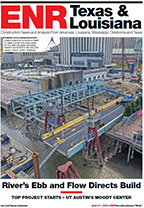Top Project Starts Spark Hope for Regional Recovery












Webber executive Hasbrook says that, looking forward, TxDOT lacks traditional funding to keep up with road projects, especially as people drive less or use more fuel efficient vehicles. As a result, alternative delivery methods will be more prominent, he says.
"I see the use of public-private partnerships as key to getting a lot of roads completed that otherwise couldn't be completed given the current economic and funding issues," Hasbrook says. He expects the Legislature to lift limits on the number of projects that can benefit from public-private partnerships in order to build planned roads and to free up state money to move other projects forward.
Health Care
The health care market accounted for 10 projects worth more than $3 billion, including the $1.1-billion University Medical Center—a replacement for Charity Hospital in New Orleans—on which Skanska and locally based MAPP Construction broke ground in July.
The $800-million University of Texas Southwestern Medical Center's New University Hospital in Dallas also broke ground in 2011. Hunt Construction Group, Dallas, expects to complete the 1.35-million-sq-ft, 13-story hospital in November 2014.
Skanska's Cannon says that with the start of the Wilford Hall Ambulatory Care Surgical Center, the region is seeing the wave of major military projects begin to ebb. "The federal work is winding down, compared to the last three or four years," he says. Still, he notes that other health care projects are starting to move forward, especially in Dallas.
But the health care market "seems to have a lot of activity," says Balfour Beatty's DeVoe. The firm broke ground on the $59-million Forest Park Medical Center in nearby Frisco. Houston also saw its fair share of new major health care projects in 2011. Vaughn Construction, based there, began work on the $254.8-million Sheikh Zayed Bin Sultan Al Nahyan Building for Personalized Cancer Care, located within the University of Texas MD Anderson Cancer Center at the Texas Medical Center.
Commercial and Industrial
The health of Houston's development market has always hinged on the petrochemical industry, and oil companies are investing heavily in the metro area these days.
"Houston goes as the oil industry goes," Cannon says. "When the oil business picks up, all the business picks up."








